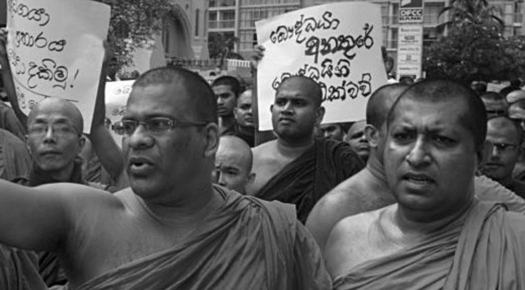
At least two people have been killed and eight others injured in anti-Muslim riots in Sri Lanka. The unrest in the district of Kandy began when angry mobs, made up of the majority Sinhalese ethnic group, attacked Muslim businesses and houses and at least one mosque. There were groups of men wielding clubs seen roaming the streets, some of them covering their faces, and police responded by firing bullets in the air and using tear gas to clear the crowd. Sri Lanka’s government responded by imposing a nationwide state of emergency for the first time since the civil war, and soldiers were deployed across the island for an initial 10-day period to prevent the unrest from spreading.
“We have decided to declare a state of emergency to ensure these clashes and tensions don’t spread elsewhere in the country,” said Dayasiri Jayasekera, a government spokesman. He also said that law enforcement would act against “all communal hate speech posts on social media” and the government blocked Facebook and other social media services in an effort to quell the violence. The Sri Lankan Prime Minister, Ranil Wickremesinghe, condemned the "racist and violent acts" in Kandy and promised to "take further action." All schools in the district have been closed and the governments of the United States, Britain and Australia have issued travel warnings to their citizens.
The death of a Sinhalese Buddhist youth, allegedly at the hands of a group of Muslim men, has sparked the riots. A taxi carrying four Muslim men collided with a van driven by a young Buddhist man, according to local police. The Buddhist man was assaulted with an iron bar and succumbed to his injuries in hospital, police confirmed. The four Muslim men have since been arrested and remain in police custody.
After the violence in Aluthwatte, some 22 miles north west of Kandy, the body of a twenty eight year old Muslim man was pulled from the burned-out wreckage of a house set on fire the previous day by Sinhalese Buddhists. The victim was identified as Abdul Basith, who had just gotten a job as a local reporter for a radio station. The house was burned to the ground, witnesses said.
Sri Lanka, officially the Democratic Socialist Republic of Sri Lanka, is an island country in South Asia, located southeast of India and northeast of the Maldives. The island is home to many cultures, languages and ethnicities. The majority of the population is from the Sinhalese ethnicity, while a large minority of Tamils has also played an influential role in the island's history.
Muslim groups make up less than 10% of the overall population in Sri Lanka. The tensions between Sinhalese Buddhists and Muslims have escalated since the end of the civil war in May 2009, and this type of community violence also happened in 2014. Sri Lanka’s civil war ended but observers say many of the underlying causes of the war still remain and the country’s relative stability could further deteriorate if the government does not win trust of the minority groups by providing protection and justice.
Photo Credits: Groundviews - Journalism for Citizens
